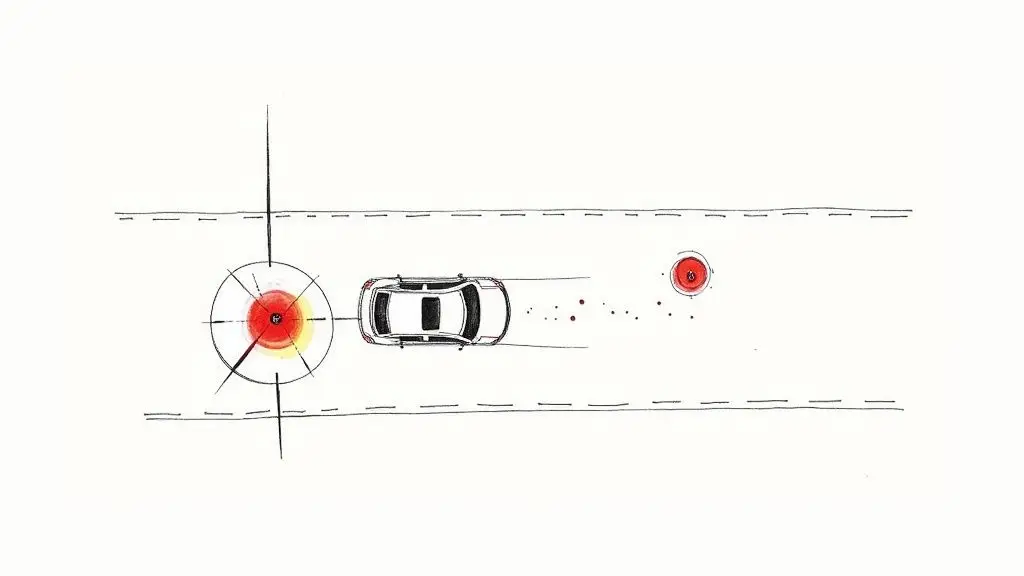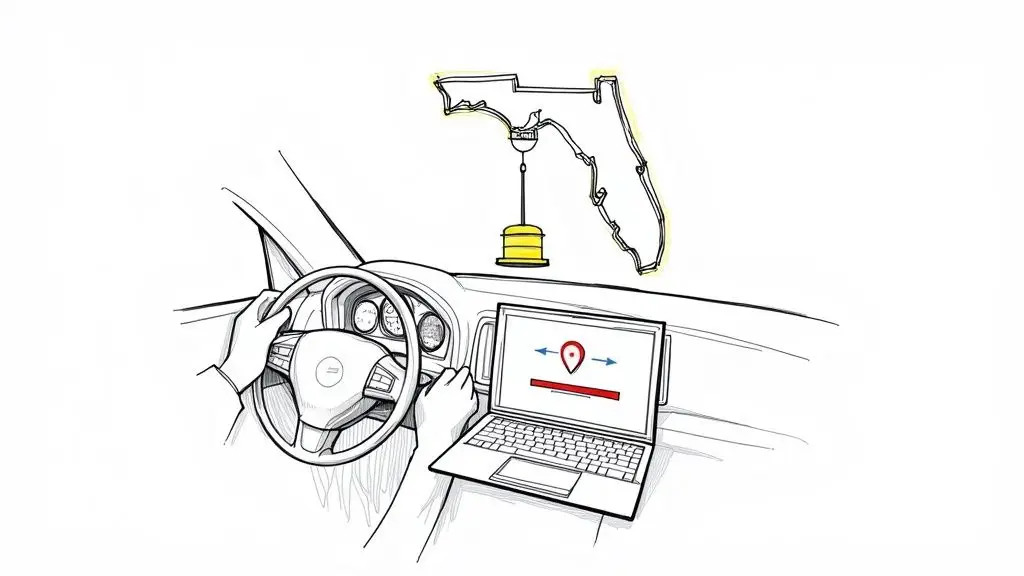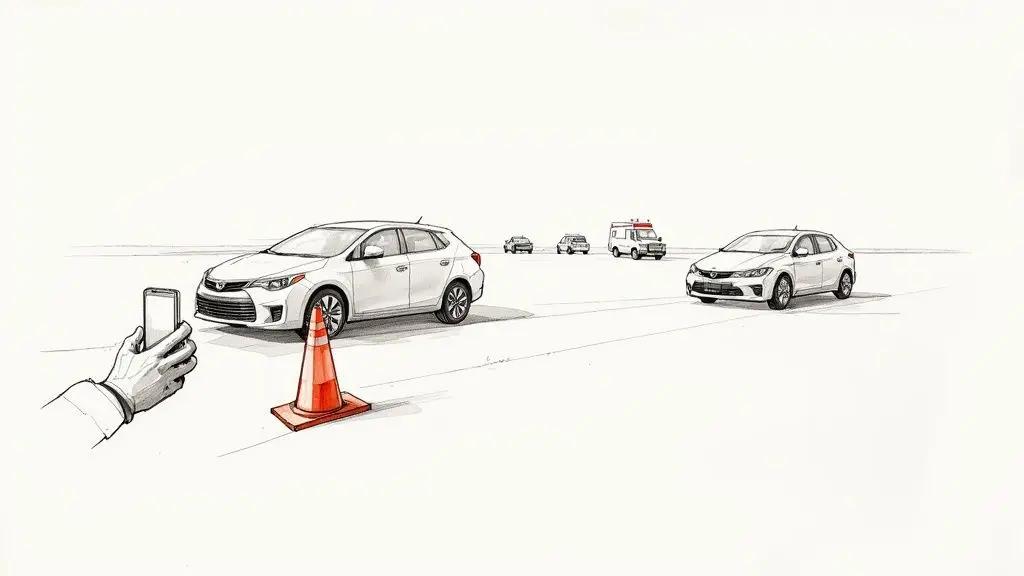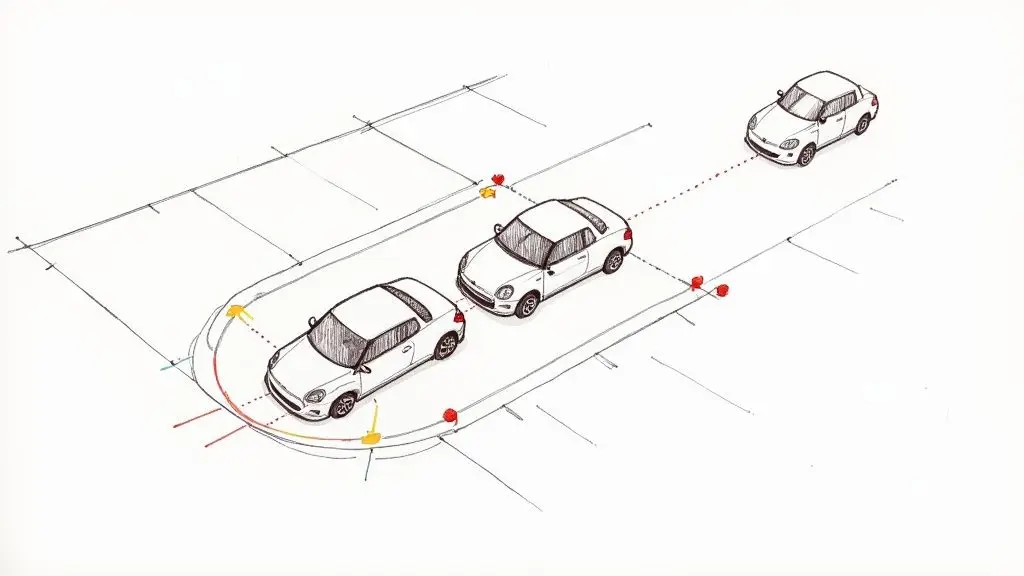Getting a traffic ticket can be frustrating. It often brings worries about points on your license and higher insurance costs. However, there is a helpful option available. Taking a traffic school, also known as a driver improvement course, can be a great way to handle a minor driving mistake.
This type of course is a state-approved program. It helps you review safe driving habits and important roadway laws. Instead of a punishment, it is a chance to keep your record clean and become a better, more defensive driver.
What is a Driver Improvement Course?
When you get a traffic ticket, choosing a defensive driving class can be a smart move. In short, the main goal of the course is to reinforce good driving skills. It also makes sure you are up-to-date on the rules of the road.
Government agencies offer this option so drivers can fix a mistake. As a result, a single ticket does not have to lead to years of higher insurance costs. A driver improvement course is a proactive way to manage the situation and improve your skills behind the wheel.
Why Do Drivers Take a Defensive Driving Class?
People usually attend a driver improvement course for a few common reasons. While each person's situation is different, the goal is always the same. First, you must complete the course. Then, you satisfy the legal requirement and become a safer driver.
Here is a quick look at why drivers often enroll in a defensive driving class.
Common Reasons for Attending a Course
| Reason for Attending | Who It Typically Applies To | Primary Benefit |
|---|---|---|
| Avoid Ticket Points | Drivers with a common, non-criminal moving violation. | Keeps points off your license and helps prevent insurance increases. |
| Court or State Order | Drivers told by a judge or state agency to attend. | Fulfills a legal requirement to keep your driving privileges. |
| Insurance Discount | Any driver who signs up voluntarily to improve skills. | Lowers your car insurance bill by showing you are a safe driver. |
As you can see, attending a course has positive outcomes. It can help your driving record and also save you money.
The Benefits of Completing Traffic School
No one gets excited about taking a required course. But if you look beyond the ticket, completing a defensive driving class has real benefits. The biggest advantage is keeping your driving record clean. For instance, it can prevent points from a ticket that might lead to a license suspension.
According to the National Highway Traffic Safety Administration (NHTSA), driver error is a factor in about 94% of crashes. A defensive driving class helps fix this by teaching you how to avoid common mistakes. You can learn more about crash data from the NHTSA.
A clean record also helps you get lower insurance costs. When you finish a course, your insurance provider sees you as less of a risk. Therefore, you may get a discount on your policy. Finally, the knowledge you gain makes you a safer, more confident driver. This is a benefit for everyone on the road. For more safety facts, the Insurance Institute for Highway Safety (IIHS) provides detailed statistics.
Who is Eligible for a Driver Improvement Course?
After getting a ticket, you might think paying it is the easiest option. However, attending traffic school is often a better choice. But not everyone is eligible. States have specific rules about who can sign up for a driver improvement course. It is important to know if you qualify.
Generally, there are three paths to taking a traffic school class. First, you can choose to take it to keep points off your license. Second, a court might order you to attend. Finally, you can sign up on your own to lower your insurance bill. Each situation has different rules.
Choosing to Attend Traffic School for a Ticket
This is the most common reason. Many people take a driver improvement course after a moving violation to avoid points. In most states, this is called "electing" to take the course. However, you cannot use this option every time you get a ticket.
States often have limits on this choice.
- You may only be able to attend traffic school once every 12 to 18 months.
- There might be a lifetime limit, such as five times in total.
Think of it as a special pass with an expiration date and a firm limit. If you recently took a course for another ticket, you may not be eligible for this new one. In addition, once you reach the lifetime limit, the option is gone forever. The main benefit is that when you complete the course, no points are added to your record for that ticket. This helps keep your insurance rates from going up.
When Traffic School is Required by a Court
Sometimes, you do not have a choice. A judge or your state's motor vehicle agency can order you to complete a driver improvement course. This usually happens in more serious situations.
For example, a judge may require a course as part of a sentence for a major traffic offense. The state can also mandate it if you were at fault in a collision where someone was hurt. It might also be required if you have multiple crashes in a short period. For details on state laws, it is best to check your official state government website, like the Florida Department of Highway Safety and Motor Vehicles (FLHSMV).
Taking a Course Voluntarily for an Insurance Discount
You do not need a ticket to benefit from a defensive driving class. In fact, many drivers take a course voluntarily. The simple reason is to save money on car insurance.
Many insurance companies offer a discount if you complete an approved defensive driving course. It shows them you are a responsible, low-risk driver. As a result, they may reward you with a lower premium.
If this sounds like a good idea, follow these steps:
- Call your insurance agent first. This is very important. Confirm they offer a discount and ask which courses qualify.
- Sign up for an approved course. The course must be officially approved by your state to be valid.
- Send them your completion certificate. After you finish, give the certificate to your insurer to get the discount.
This is a great way to improve your driving skills and save money at the same time. The U.S. Department of Transportation (USDOT) also provides resources for improving driver safety.
Choosing Your Traffic School: Online vs. In-Person
You have decided to take traffic school. That is a smart decision. Now, you need to choose how you will take it. Should you sit in a classroom, or complete it online? Most states offer both options. There is no single "best" answer. It depends on your schedule, how you learn, and what you find easiest.
An in-person class is like a traditional school course. You go to a specific location at a set time. You listen to a live teacher and learn with other students. This can be great if you like structure and asking questions in real time.
Then there is the online option, which offers more freedom. You can study from home, a coffee shop, or during your lunch break. For anyone with a busy schedule, this flexible style is very helpful.
The Advantages of Online Learning
For most drivers today, online traffic school is a popular choice. The freedom to set your own schedule is likely the biggest benefit. Instead of setting aside a full day for a class, you can break the course into smaller parts that fit your life.
Here is why many people choose the online option:
- Complete Flexibility: You decide when and where to study. There is no commute and no strict start time.
- Learn at Your Own Pace: You can move quickly through topics you know well. You can also spend more time on trickier subjects. The course moves at your speed.
- Comfort and Privacy: Learning is easier when you are comfortable. Completing the course at home can be a more relaxing experience.
This shift to online learning is growing. People want convenient options, and online courses provide that. The Governors Highway Safety Association (GHSA) offers resources on current traffic safety trends that influence driver education.
When In-Person Classes Are a Good Fit
Even though online courses are popular, the traditional classroom is still useful. It provides a dedicated learning space away from distractions at home. For some people, being in the room with a teacher and other students helps them stay focused.
An in-person class might be right for you if you:
- Prefer face-to-face interaction and enjoy asking questions directly.
- Learn best by listening to lectures and taking part in discussions.
- Need a set schedule to stay accountable and avoid delaying the work.
Having direct access to an instructor is a major benefit. If you are confused about a traffic law, you can get an answer right away. For additional reading on road safety education, the Federal Highway Administration (FHWA) offers many resources.
Ultimately, neither option is better for everyone. The best format is the one that fits your learning needs and lifestyle. The goal is to complete the course successfully.
How to Enroll In and Complete Your Course
So, you received a traffic ticket. It can feel confusing at first. But the process for handling it with a driver improvement course is simple once you understand the steps.
It is important to follow a series of tasks with clear deadlines. If you miss a deadline, the court may not allow you to take traffic school. This would mean getting points on your license. Let's review what you need to do to handle this correctly.
Here is a quick overview of the basic steps.
As you can see, there is a clear path from getting the ticket to finishing the course.
The Five Key Steps
To make sure you complete everything correctly, follow this five-step guide. Doing each step in order is the best way to avoid problems.
- Notify the Clerk of Court: First, you must tell the Clerk of Court in the county where you got the ticket that you are choosing to take a driver improvement course. You usually have a set time, such as 30 days from the ticket date, to do this.
- Pay the Ticket Fine: When you tell the clerk, you will also need to pay the fine. A common mistake is thinking that traffic school removes the fine. It does not. You must pay the penalty, but the course keeps points off your record.
- Sign Up for an Approved Course: Next, you can enroll. The most important thing is to choose a course that is officially approved by your state's motor vehicle agency, such as the Florida Department of Highway Safety and Motor Vehicles (FLHSMV).
- Finish the Course on Time: The court will give you a strict deadline to finish your course. This is often between 60 and 90 days from when you chose to take traffic school.
- Submit Your Completion Certificate: After you pass, you will receive a certificate. You must deliver this certificate to the Clerk of Court before your deadline. This is the last step to close your ticket.
As a helpful tip, always keep copies of your documents. This includes your payment receipt, enrollment confirmation, and especially your completion certificate.
Do Not Miss Your Deadlines
Meeting your deadlines is extremely important. If you wait too long, you could lose the chance to keep points off your license.
Let's look at an example. Imagine you get a ticket on June 1st.
- You have until July 1st to tell the court you are taking traffic school and pay your fine.
- If the court gives you 90 days to finish, your certificate would be due around August 30th.
As soon as you decide to take a course, mark these dates on your calendar. State laws, like Florida's Move Over Law, are strictly enforced. Failing to follow court rules can lead to more penalties. The FLHSMV provides clear details on this law.
Here is a good piece of advice: submit your completion certificate as soon as you get it. Do not wait until the last day. This can help you avoid stress if there is a delay at the court.
What Happens After You Finish the Course?
Once your certificate is submitted and accepted, your work is done. The clerk will process the paperwork, and no points will be added to your driving record for that ticket.
But there is one more thing you should do. Contact your auto insurance agent. Tell them you completed a defensive driving course and offer a copy of your certificate. Many insurance companies give a discount for this. This could lower your premium for several years. Proactive steps toward safer driving are often rewarded.
What You Will Learn in a Defensive Driving Class
Have you ever wondered what is taught in a traffic school? Today’s driver improvement courses are a useful review of the skills you use every day. The state-approved material focuses on real-world driving situations.
The goal is not just to meet a court requirement. It is designed to make you a safer and more confident driver. You will review important traffic laws, learn new ways to spot hazards, and be reminded of the risks of common driving mistakes.
Core Defensive Driving Strategies
A major part of any driver improvement course is defensive driving. This is a proactive way of thinking on the road. It teaches you to expect and react to hazards, like another driver's mistake or poor road conditions. It is all about staying in control.
You will learn useful techniques you can use right away, including:
- Safe Following Distance: A simple way to make sure you have enough space between you and the car in front of you. This gives you time to react.
- Hazard Identification: This involves training your eyes to scan the entire area around you. This helps you see potential problems early.
- Escape Paths: You will learn to always have a way out. This means looking for an open lane or shoulder you can use if something goes wrong.
These skills are very important. The National Highway Traffic Safety Administration (NHTSA) states that being alert and managing the space around your vehicle are two of the best ways to prevent a collision.
Understanding State Traffic Laws
Roadway laws can change over time. It is easy to forget the details. A driver improvement course updates you on current state laws. This ensures you know what is expected of you on the road.
This part of the course is a clear review of the rules. It covers everything from right-of-way at intersections to specific laws for school zones and emergency vehicles.
For example, you will review laws like Florida’s Move Over Law. This law requires you to move over a lane or slow down for stopped police, emergency, or utility vehicles. The Florida Department of Highway Safety and Motor Vehicles (FLHSMV) emphasizes these rules because they protect first responders.
The Dangers of Impaired and Distracted Driving
The course also focuses on two of the most dangerous behaviors: impaired driving and distracted driving. You will review data and statistics that show how serious these actions can be.
The lessons explain how alcohol and drugs affect your reaction time and judgment. You will also learn about the dangers of things many people do without thinking, like texting or using a GPS. Studies show that good driver education improves safety records, especially for new drivers. The U.S. Department of Transportation has more information on the risks of distracted driving.
What to Do After You Finish Your Course
You have passed the final test and completed your traffic school course. That is a big accomplishment, but you are not done yet. You have a few more important tasks to ensure your hard work pays off.
Finishing these last steps will officially close your ticket and keep your driving record clean.
Submitting Your Certificate to the Court
First, you need to get your completion certificate to the Clerk of Court in the county where you got the ticket. This is your responsibility, and you must meet the deadline.
Your traffic school will give you the certificate after you pass. Then, you need to find out how that county wants to receive it. The best way is to check the clerk's official website. Most counties accept one of these methods:
- Online: Many counties let you upload the certificate directly through an online portal. This is often the fastest method.
- In-Person: You can always take it to the clerk's office yourself.
- By Mail: If you mail it, consider using a service with tracking to prove it arrived on time.
After sending it, wait a few days and then follow up. A quick phone call or a search on the clerk’s website can confirm they processed it. For extra peace of mind, you can check your official driving record to confirm no points were added.
Tell Your Insurance Company
Once the court has your certificate, make one more call to your insurance agent. Let them know you have finished a state-approved defensive driving course. This can often lead to savings.
Ask your agent if you qualify for a safe driver discount. Most insurance companies offer one because they see you as a lower risk. You will probably need to send them a copy of your certificate. It is a small step that could lead to a lower premium.
Completing a driver improvement course does more than just handle a ticket. It shows your insurance company you are a responsible driver, which may lead to lower rates for years.
Taking these courses is a smart move for many drivers. By completing these final two steps, you can get every benefit from your effort.
Frequently Asked Questions About Traffic School
You might still have some questions. That is perfectly normal. Here are answers to some of the most common questions drivers have about traffic school.
How do I know if a traffic school is approved?
This is very important. You must choose a course that is officially approved by your state. If it is not, the court will not accept your certificate. You will have wasted time and money.
Thankfully, state motor vehicle agencies make this easy. They keep a public list of all approved course providers. Before you enroll:
- Check the official list. Always visit your state's official motor vehicle website to see if the school is listed.
- Look for proof. Approved schools often display their state approval information on their website.
- Be careful of promises that seem too good to be true. All approved courses must follow a state-required curriculum.
A quick check can save you from a big headache.
Will this course remove points from my record?
This is a common point of confusion. A driver improvement course does not remove points that are already on your record from past tickets. Instead, it is a preventive action.
By completing the course for your current ticket, you stop new points from being added to your driving record in the first place.
For that specific ticket, it is as if the points never existed. To understand how points affect your record, check your state's official points system. For example, the Florida Highway Safety and Motor Vehicles (FLHSMV) website explains this in detail.
How much time do I have to finish the course?
Timing is critical. After you tell the Clerk of Court that you are taking traffic school—a decision you must usually make within 30 days of getting the ticket—the clock starts.
The court will give you a firm deadline. In most cases, you will have between 60 and 90 days to finish the course and submit your completion certificate. Always confirm the exact date with the Clerk of Court for your county. Missing this deadline means you will get points on your license.
Can I take traffic school for a red light camera ticket?
Yes, but the process is a bit different. When you first get a "Notice of Violation" from a red light camera, you can often just pay the fine, and no points are added.
However, if you ignore that first notice, it becomes a formal "Uniform Traffic Citation." At that point, it is treated like any other moving violation. You can then choose to take a driver improvement course to avoid the points. The National Highway Traffic Safety Administration (NHTSA) provides guidance on how these programs improve intersection safety.
Are you ready to protect your driving record and become a safer driver? Our state-approved courses are designed to be convenient and fit your schedule.





